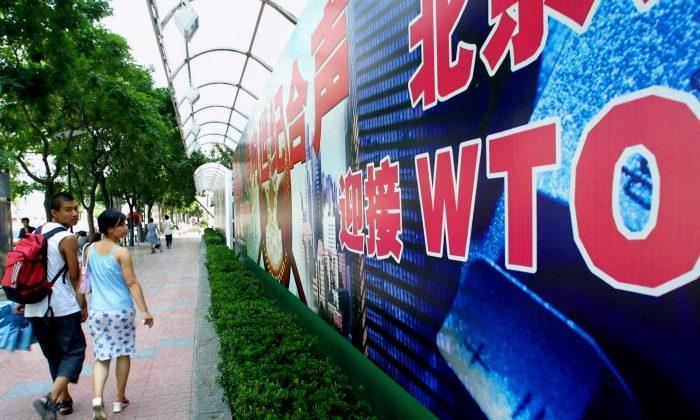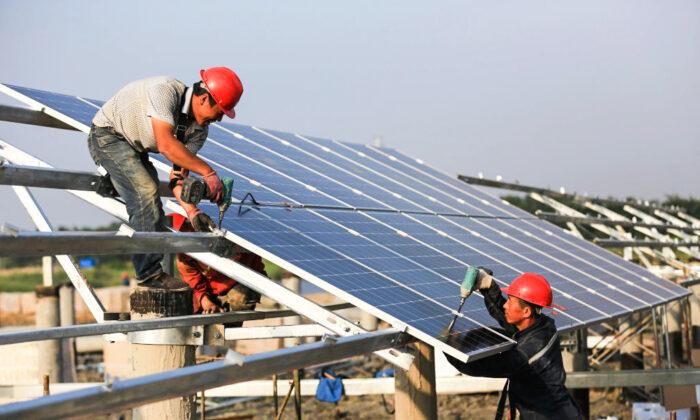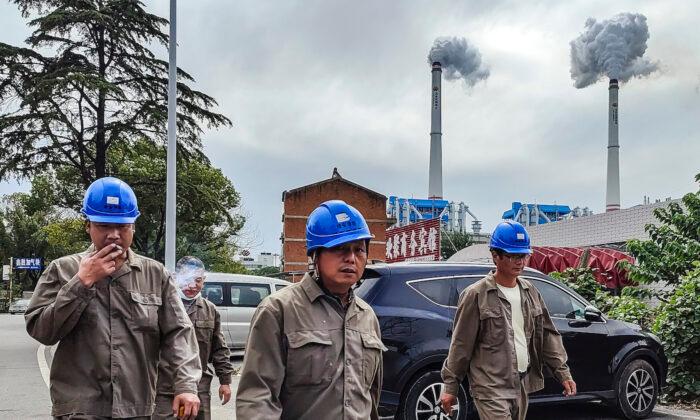On Dec. 11, 2001, China became a member of the World Trade Organization (WTO). This would have been impossible without U.S. support.
In retrospect, it was one of the worst decisions we ever made.
To be clear, the United States supported China’s membership in the WTO and other international organizations based on its supposed commitment to market reform and compliance with the rules, even if this rise came at the expense of Western democracy, security, and common sense. We all too often turned a blind eye and shied away from talking directly about the Chinese regime’s lack of transparency, reciprocity, and environmental standards; its human rights abuses and use of slave labor; and its countless violations of prior agreements and international law. Frankly, we thought (and hoped) that communist China would become a market-driven and, ultimately, a more democratic country.
This played into the hands of the Chinese Communist Party’s (CCP) well-honed economic warcraft doctrine. As a result of our naivety, we handed over priceless intellectual property by allowing access to our most prized research institutions. We also gave the CCP sophisticated process engineering for some of our most valuable products and technologies by building state-of-the-art plants in China. We then became dependent on China for key components and processed materials by outsourcing manufacturing, which enabled it to ransack small- and medium-sized firms in the industrial Midwest with its weapons of mass production.
This allowed China to buy up some of our country’s most valuable assets through forced technology transfers, theft, deception, strategic subsidies, talent poaching, cyber hacking, intimidation, and financial seduction. On top of that, we permitted China to access our low-cost capital markets without having to comply with standard accounting practices, which meant that it couldn’t be audited. This allowed the CCP to finance the buildup of its surveillance and military state.
My Personal Perspective
Needless to say, my perspective on the CCP’s techno-economic warcraft dates back to my upbringing in the American Midwest. My German American father instilled in me the values of honesty and hard work. My childhood experience of welding in my dad’s five-person machine shop gave me a love for manufacturing, where he would explain that small companies like his were the heart and soul of the U.S. economic engine, just like Germany’s mittelstand. He taught me that the key to our two countries’ manufacturing prowess was fair competition, which drives productivity and raises the standard of living. His goal was to have me be better off than him and my children better off than me.Over the years, it was painful to watch how China’s weapons of mass production gutted the U.S. equivalent of the mittelstand manufacturing base. I witnessed firsthand its devastating impact on thousands of small- and medium-sized businesses, such as my father’s machine shop. I didn’t understand it at first, but now I recognize that this was a result of Beijing’s economic warcraft strategy of using state subsidies, currency manipulation, dirty unregulated energy, and forced labor to manipulate competitive advantage.
During my 10 years as a vice president of General Motors, I saw the Chinese forced technology transfer playbook. I learned that building factories in China meant not only handing over blueprints, but also the engineering know-how of American companies.

After 30 years in Silicon Valley, I saw Beijing’s nonstop cyber hacking and intimidation. I’ve been wooed by CCP officials and state-sponsored Chinese companies to do “friendly” joint ventures. I saw a flood of Chinese government money buy distressed companies with invaluable technology and stealthily invest in state-of-the-art startups. I’ve even felt the pain of getting my company’s crown jewels stolen by China, Inc. when Alibaba stole Ariba’s intellectual property.
With My CEO Glasses On
As a former CEO of public companies, I look at it this way: If I’m competing against you, and I can steal your intellectual property; use slave labor; engage in bribes; subsidize my own companies; never have to be transparent; utilize unregulated cheap coal-fired power plants; don’t have to be reciprocal with my home market, but at the same time force you to transfer your technology; and I can buy your companies, but you can’t buy mine; I can hire your country’s bankers and lawyers, but you can’t hire mine; I get access to your data, but you get none of mine; I can spread my propaganda in your country, but I don’t let the truth into mine; your books have to be audited, but not mine; and I don’t have to obey the law, or I am the law—then I'll beat you every time.American CEOs Taking Off Rose-Colored Glasses
Many American CEOs are now beginning to take off their rose-colored glasses and are treating communist China not as we hoped it would be, but how it truly is. China’s attempt to portray itself as a misunderstood and well-intentioned global partner has failed. Companies doing business with China have endured parasitic joint ventures, blatant intellectual property theft, a worldwide bullying spree, and the coerced collection of proprietary information that has been exploited for China’s commercial advantage.After Russian President Vladimir Putin’s invasion of Ukraine, more than 300 of America’s most prominent corporations frantically curtailed their business in Russia. It doesn’t take a doctorate degree in international affairs to understand the common threads that underpin the China–Russia partnership. Both governments are known for lawless behavior, duplicity, bullying, domestic oppression, coercive economic practices, and grave human rights abuses. It’s also no surprise that the tech giants that form the backbone of China’s surveillance state–such as Huawei, Alibaba, Tencent, and Xiaomi—are still happily doing business in Russia.
CEOs know that they can’t afford to get caught off guard on this one because the impact will be 10 to 20 times greater than the Russian experience. They understand that when that moment comes, if they aren’t ready, it will already be too late. When the dreaded becomes inevitable, there’s no longer the need to fear it. CEOs must develop a plan and execute it.




